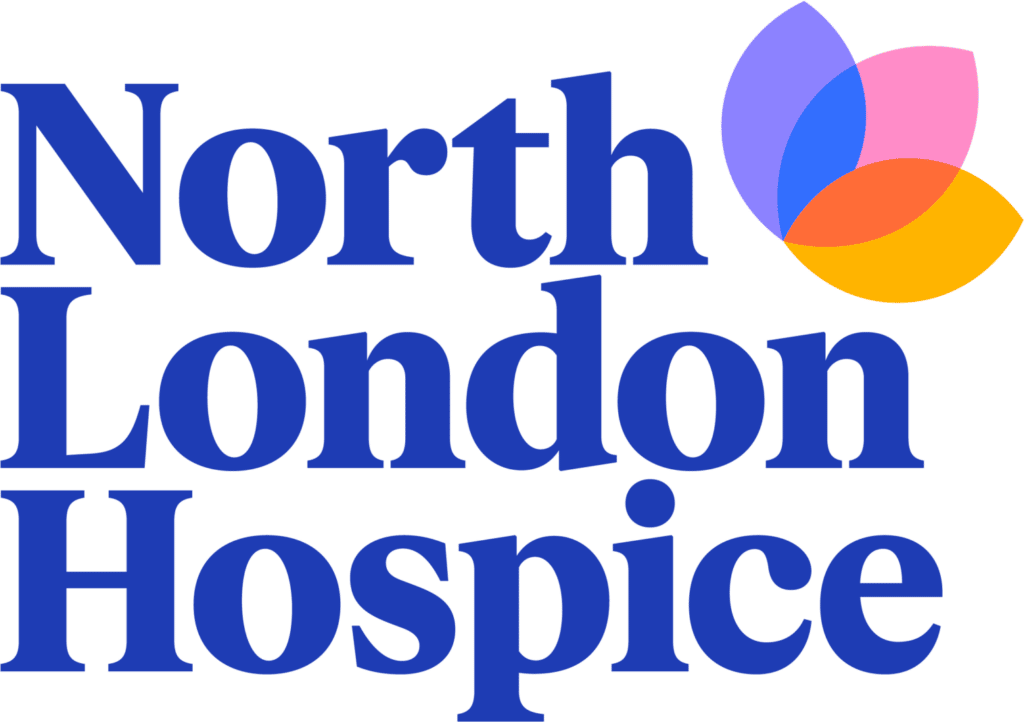Whether you’re strumming a guitar, banging the drums, tapping a tambourine or singing, our weekly Music for Life group offers a safe space for expression.
“No music experience is necessary,” says our trainee music therapist, Ross, who hosts the Thursday afternoon group (2-3pm) that’s open to all at our Outpatients & Wellbeing setting at North London Hospice – Enfield.
“Patients, carers, bereaved relatives, staff, volunteers and those on our Compassionate Neighbours programme are all welcome to attend.”

What Is music therapy?
Music therapy provides a way for people to express and process emotions without the need for words. It boosts confidence and helps find connections and meaning, positively impacting mental health.
How can it help someone living with life-limiting illness?
It can help maintain quality of life for as long as possible. Even at the very end of life, music making can offer an emotional outlet and a sense of comfort and enjoyment. It can allow people to be playful, interactive and adventurous at the time.
It might be a Simon & Garfunkel classic, or something created by a member of the group…. each week is different but provides an opportunity for a sing-along, expression, to be in the moment and enjoy the experience.

1:1 music therapy sessions are also available with Ross on a Thursday. If you’d like to give it a go, email outpatients.nlh@nhs.net
Ross is training to be a music therapist and is on placement with North London Hospice from Nordoff Robbins
Between five and seven people usually attend the group sessions, which are heavily focused on improvisation and a love of music. “It’s all song based, and everyone can contribute in some way. It’s not about playing perfect music. It’s about expression, not necessarily expressing individual emotions.”
“Music isn’t something you have to learn how to do. In other parts of the world everyone gets involved. It’s in our DNA. It can be a journey of rediscovery, unlocking feelings. There’s lots of evidence to show how beneficial music can be after trauma or bereavement. We’ve been running the music therapy group for a few months now and the feedback has been really positive. Some people come week after week and find it a very uplifting experience.”
In his 1-2-1 sessions, Ross works collaboratively with a person. “Sometimes we write songs together to help express emotion or work through particular feelings. Music therapy brings people into the present moment and can act as a release for emotions.”
In music therapy, music therapists and clients make music together. By tuning into each client’s individual responses, the therapist creates a platform for connection and self-expression. The impact on wellbeing and development – physical, social, mental and emotional – can be transformative.
Music therapy provides a way for people to express and process emotions without the need for words. It boosts confidence and helps find connections and meaning, positively impacting on mental health. It can also aid cognitive function, coordination, speech and physical development.
How is the Nordoff Robbins approach to music therapy different from other approaches?
The Nordoff Robbins approach is ‘music-centred’ – the sole aim is to reap the many intrinsic rewards of musical participation. The music making is collaborative, and these collaborations are led by clients. It is an approach shaped by research and shared through our education and training programmes.
Is music therapy an evidence-based practice?
The NR approach is underpinned by academic research, built up over several decades. Together with delivery and education, research remains one of the three central pillars of the work. This allows Nordoff Robbins to examine its practice, highlight new opportunities and train students more effectively.
How can music therapy help with trauma and grief?
For those experiencing trauma and grief, the social benefits of music making are particularly strong. It creates opportunities for bonding and collaboration. It helps build resilience. Where experiences are hard to talk about, music allows people to express the inexpressible. Carefully chosen music can bring back happy memories and help with the processing of difficult thoughts.
Further Reading on Music Therapy in a Palliative Care setting
Music therapy for palliative care: A realist review(particularly Key Outcomes beginning on p. 10)
“Both quantitative and qualitative evidence suggests that music therapy improves overall quality of life for palliative patients. Music therapy has also been shown to reduce physical discomfort and pain. In terms of psychosocial benefits, quantitative evidence suggests that music therapy improves patients’ mood and reduces anxiety. Furthermore, qualitative studies suggest that music therapy improves emotional wellbeing, social interaction and spiritual or existential wellbeing.”
A critical realist evaluation of a music therapy intervention in palliative care (scroll down to “Results”)
“They don’t see it (music therapy) as therapy. They see it as something enjoyable and about something other than their bowels and their pain. It treats them as a human with interests and loves and dislikes and a past, as opposed to, okay, let’s just discuss how medication is helping them today”. (Physician 1)
“Music is known to have a wide range of physiological effects on the human body, including changes in heart rate, respiration, blood pressure, and biochemical responses. Musical experience has been described as the ‘richest human emotional, sensorimotor, and cognitive experience’. Responses to music and pain are based on past experiences and/or present state of mind and are highly individual. By altering affective, cognitive and sensory processes, music therapy may reduce pain perception and suffering, heighten mood, and increase a sense of control and relaxation.”
From Chopin to Christina Aguilera: how music therapy helps people with a terminal illness (Marie Curie)
Music Therapy in Hospice Care – Factsheet from the American Music Therapy Association



